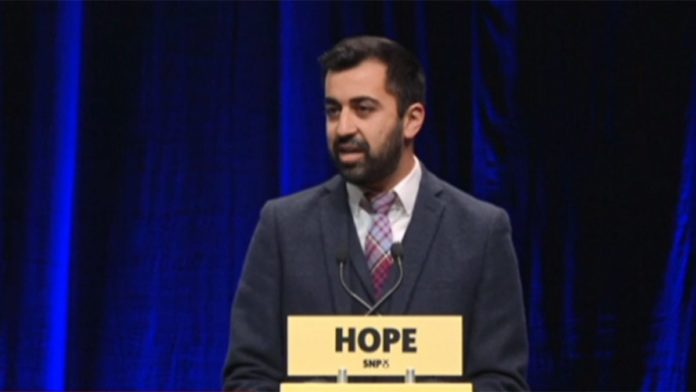
Abdul Wahid of Hizb ut-Tahrir says the message Muslims should take from Humza Yousaf’s ascent to First Minister of Scotland is that you can rise to the top jobs as long as you shed your Islamic values and adopt secular liberal ones instead.
The election of Scottish politician Humza Yousaf as the new leader of the Scottish National Party (SNP) and the First Minister of Scotland has polarised opinion.
The LBGT community has welcomed him but many Christians, Muslims and some feminists have been critical.
Some have welcomed the significance of a brown-faced, bearded man of Pakistani-Muslim heritage assuming such an office. I would disagree.
As I will lay out below, a politician who surrenders principle in order to achieve position is not a role model for anyone. He is a poster-boy for assimilation – and little else.
Some have argued that we are wrong to hold politicians to the same standards as imams.
Yet I would say this viewpoint misunderstands the nature of secular politics, and falls into the trap of becoming secularised ourselves.
Subscribe to our newsletter and stay updated on the latest news and updates from around the Muslim world!
There is indeed a symbolic significance in Humza Yousaf’s ascent – but it doesn’t show that Britain has embraced people from all backgrounds on merit and ability.
Rather, it is a moment that – at best – shows Britain is open to those who assimilate into the dominant political culture, at the expense of whatever values they held previously.
What young Muslims are being told is that you need not feel a foreigner for your skin colour, name or background IF you shed your Islamic values and adopt secular liberal ones instead.
Do that and then you too could rise to the dizzy heights such as First Minister of Scotland!
Politicians like Humza Yousaf, Sadiq Khan and others, climb up the political career ladder, and as they do they throw off values that conflict with the dominant secular ones; like someone throwing off a piece of clothing one piece at a time.
By the time they reach the top they’ve left all their values on the floor and are “politically naked.”
‘Politicians are not imams’
We are told that politicians are not to be held to the same moral standard as imams. There are many problems with such an argument.
Firstly, if we start to expect that politicians do the ruling, and imams are our moral guides, then we have adopted the language of British secularism – which absolves politicians of moral leadership and delegates it to the bishops of the established church.

Secondly, it’s as if we are no longer supposed to hold political leaders to account on their policy positions if those positions conflict with an Islamic one – on the basis that they aren’t Islamic, but secular politicians. That’s true – BUT WE ARE MUSLIMS, and we should be holding political leaders to account according to an Islamic standard!
Thirdly, it reflects a very simplistic understanding of politics – as if secular politicians are mere technocrats who govern in a value-neutral way to help all people. That is, of course, nonsense. All politicians govern according to a value-orientated position.
The values come in part from the party-political position – but more importantly they come the foundational principles of politics in Britain (as well as Europe, North America and elsewhere in the democratic world) – which is that politicians and parties must adopt secularism as a basis; must be somewhere within the spectrum of liberalism and capitalism; and must recognise the Zionist occupation of Palestine (even if they support some kind of justice for Palestinians).
Not to adopt these positions would mean your career will fail at some stage. You are expected to conform to these norms, not to change them. Hence, policies emerge from this basis, making the choices extremely problematic for any Muslim who enters this arena.
When you support these positions, you’ll be promoted. When you contradict these positions you find yourself sanctioned. That’s how the assimilation process works.
The Muslim community response
By and large, the response from Muslims has been understandable – they would have compared Hamza Yousaf to his rival Kate Forbes, who appeared more principled when she stuck to her line on a variety of social issues and sexual ethics.
By comparison, Yousaf’s position looked terrible. His campaign to protect LGBTQ+ violates the rights of kids in schools not to be sexualised and confused in the way they have increasingly been.
He is a clear example of someone who “identifies” as Muslim, but practices being a secular liberal in the political arena – and as a politician, he works to impose these views on everyone else.
All of this shows how politics and belief are intertwined, regardless of what advocates of secularism (and the naive amongst Muslims) might believe.
The fundamental question that needs addressing for everyone becoming involved in wider society is this: If it comes to a conflict between my principles and my achieving political success – which comes first?
The Sunnah of Machiavelli is that the ends justify the means – and we are nothing if we don’t get political success.
The Sunnah of the Messenger of Allah (ﷺ) was that neither the Sun nor the Moon would shake him from his principles – and that political success, like any success, comes from Allah alone, and is only of any value when granted to those who remain steadfast.
Abdul Wahid is currently the Chairman of the UK Executive Committee of Hizb ut-Tahrir in Britain. He has been published on the websites of Foreign Affairs, Open Democracy, the Times Higher Educational Supplement and Prospect Magazine. You can follow him on Twitter @AbdulWahidHT.


















